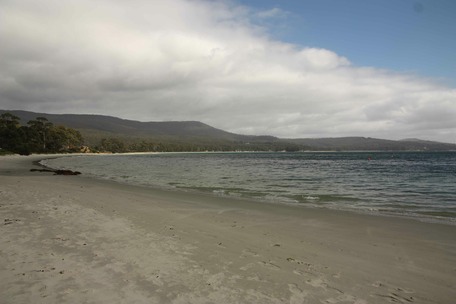
As was the case right along the coastline where the whalers and sealers operated there were issues with the indigenous population, particularly with the women and girls, and In 1829, the colonial authorities commissioned George Augustus Robinson to set up an Aboriginal mission near Great Bay on the Island, a decision that brought Truganini, daughter of Nuenonne leader Mangana into the picture. Born around 1812, when she and her father met Robinson in 1829 her mother had been killed by sailors, her uncle shot by a soldier, her sister abducted by sealers, and Paraweena, her intended husband, murdered by timber-getters. She died in 1876, reputed to be the last full blood Tasmanian Aboriginal
The mission was supposed to attract the Aboriginal people, and encourage them to “come in” and become farmers, with the main purpose being a reduction in raids on the settlers property and livestock. Convicts constructed a residence for Robinson and separate dormitories for themselves, the Aboriginal children and the adults, cleared land for paddocks and a garden and dug a saw pit, but the enterprise was abandoned after nine months as introduced diseases took their toll on the residents.
The abandoned mission decayed and disappeared, but the site is now part of Murrayfield, a sheep property on managed by the Indigenous Land Council for the weetapoona Aboriginal Corporation.
European settlement followed a land grant to Hobart Harbour Master and Pilot Captain James Kelly on North Bruny in 1818, and convict labour was used to construct a pilot station at Variety Bay from 1831, St Peter's church in the same vicinity in 1846 and the iconic Cape Bruny Lighthouse in 1836.
By the middle of the century whaling and small crops had been replaced by timber getting and large sheep farms such as Murryfield. There were regular races meetings on a race track on Murryfield with spectators brought from Hobart by ferry.
Sawmills on the more heavily timbered South Bruny supplied timber as far afield as Europe and a settlement at Adventure Bay was marked on maps as Cooktown. Most of the current settlements on South Bruny. Lunawanna (formerly Daniels Bay), Alonnah (formerly Mills Reef) and, of course, Adventure Bay started off as timber ports.
The Eco Cruise operation's facilities at Adventure Bay are, to all intents and purposes, the rallying point before the nautical part of proceedings begin, with two buses disgorging passengers to join those who've made their way to the rendezvous by other means. Morning tea is a fairly obvious step to offer while things get sorted, though you mightn't feel like availing yourself of it if you're inclined to motion sickness. In any case, having had a light breakfast and unsure about conditions out there, we decided against it. The decision had nothing to do with the $6 they were charging for something that seemed pretty basic.